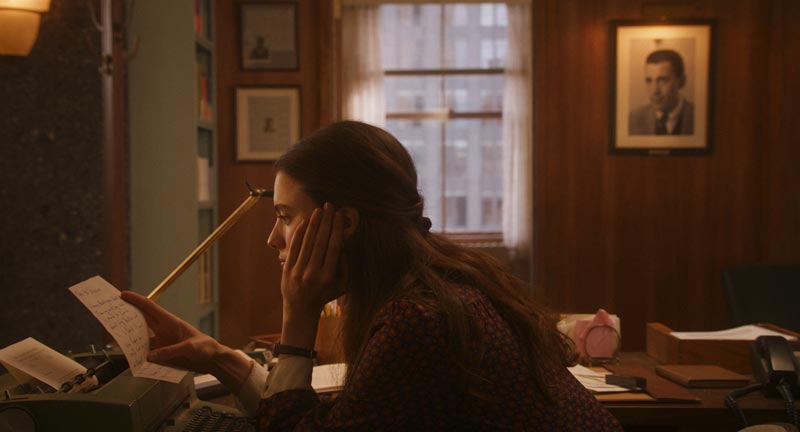My Salinger Year: did Joanna Rakoff talk to J.D. Salinger?
14 March 2022

Still from My Salinger Year, courtesy of Mongrel Media.
In late 1995 twenty-three year old Joanna Rakoff abruptly leaves her degree course, and boyfriend Karl, at Berkeley, California, and returns to her native New York. She’s had enough of studying the work of other writers, she wants to write for herself. And what better place to do so than New York City. But she still needs to pay the bills.
Initially hoping to find work with a book publisher — and the industry contacts that would come with the role — Rakoff instead takes a job as an admin assistant at one of New York City’s oldest literary agencies. Little has changed in the agency’s office, she later quips to friends, since 1927, a place where the office photocopier is considered high-tech.
Computers are forbidden. Agency boss Margaret believes they create work, rather than reduce it. The literary agency appears to be as old-school as they come. But there is one consolation for Rakoff. The agency represents none other than reclusive author J.D. Salinger, he of The Catcher in the Rye fame, a book, ironically she has not read.
Released on 1 January 2021 in Australia, My Salinger Year is Canadian filmmaker Philippe Falardeau’s screen adaptation of the 2014 memoir of the same name, written by literary journalist and author Joanna Rakoff, played by Margaret Qualley. But while Rakoff’s book was well received, Falardeau’s adaptation of her memoir did not meet with the same acclaim.
Salinger’s Miranda Priestly problem
Despite being a nostalgic stroll through a New York City that no longer exists, and a visual treat, with its warm, saturated hues, and lovingly rendered frames, My Salinger Year rates a paltry fifty percent among critics, according to film review aggregator Metacritic. Critics had a number of issues with the production.
Peter Bradshaw, writing for The Guardian thought My Salinger Year tried too hard to be another The Devil Wears Prada, and failed abysmally:
The provincial-making-it-in-the-big-city genre is well established, but the influence of The Devil Wears Prada is so clear it almost begins to feel like a upscale homage. It suffers in comparison because The Devil Wears Prada is forthright and funny with Anne Hathaway and Meryl Streep delivering fireworks. Perhaps Qualley and Weaver could have done the same with a sparkier script. But the all-important master-servant hero-worship dynamic is always stymied: diverted on to the semi-unseen and necessarily unresponsive Salinger.
When I saw Margaret coldly ignoring Rakoff on her first day of work at the agency, I too thought of Miranda Priestly. But I’m not sure making Margaret out to be a Priestly clone was the filmmaker’s intention. Meanwhile Peter Debruge, writing for Variety, didn’t think Qualley’s portrayal of Rakoff as an aspiring writer was convincing:
Director Philippe Falardeau (who made one very good movie in the form of “Monsieur Lazhar”) has written Joanna Rakoff as well-read and intelligent, but Qualley has a dopey, nobody-home quality: The actor looks eager and ready to please, standing politely with her shoulders back and hands clasped like an obedient schoolgirl, but there’s nothing happening behind the eyes. Portrayed thus, Joanna comes across as childlike, naive and shockingly shallow. Though she’s no doubt plenty bright in person, close-ups in which she’s shown thinking are eerily unconvincing.
It’s true Qualley portrayed Rakoff with wide-eyed enthusiasm, and a breathy exuberance, but I wouldn’t say the lights were on but no one was home. Let’s not forget Rakoff aspired to other things, and working at the agency wasn’t exactly what she wanted in the first place. She didn’t see the role as a stepping stone, but rather a means to keep a roof over her head.
My friend Salinger
While My Salinger Year may not rate as award winning drama, the question remains. Were the interactions viewers of the film witnessed between Rakoff and Salinger the real deal, or were the producers’ taking some cheeky poetic licence? And while we may never know exactly what did transpire, Rakoff and Salinger indeed spoke to each other.
Given the nature of Rakoff’s work at the agency, corresponding — by way of standard, clipped, responses — to the volumes of Salinger fan mail the agency received, regular communication between the pair might go without saying. But the hermit-like Salinger had no interest in what his readers had to say.
But on learning Rakoff wrote poetry, Salinger warmed to her. He even encouraged her writing, almost chastising her for doing humdrum office work. “Don’t get stuck answering the phone Joanna, you’re a poet,” he said to her on one occasion. He cared, even if the then partly deaf author did get her name wrong, when they first spoke:
Salinger, when Rakoff finally plucks up the courage to converse with him, is indeed kind to her. He is extremely deaf, and gets her name wrong. But he also encourages her to keep writing her poetry (he reveres poets).
While Salinger didn’t ask to see her work, it’s hard to imagine Rakoff being disappointed. When a literary giant is in your corner, rooting for your writing ambitions, what more do you need? Who wouldn’t give up the dead-end day job, and follow their dreams. And this is who My Salinger Year — for all its apparent faults — really speaks to: the dreamers with the big ideas.
RELATED CONTENT
